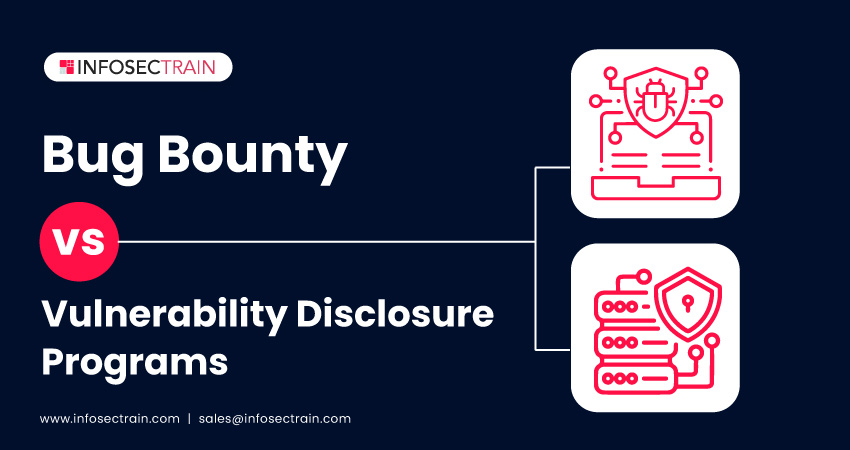Bug Bounty Vs. Vulnerability Disclosure Programs
Security breaches and ethical hacking are getting attention these days, and hackers are constantly hunting for new security flaws to attack. Many organizations volunteer their security to identify and repair system vulnerabilities before criminals exploit them. Many organizations provide Bug Bounties to incentivize security researchers with financial awards for discovering critical vulnerabilities. Other organizations provide Vulnerability Disclosure Programs where researchers can report flaws and gain acknowledgment, usually through praise or awards.

What is a Bug Bounty?
A Bug Bounty is a monetary compensation corporations pay to Ethical Hackers who find security bugs. A Bug Bounty Program might be open to the public or closed to the public, and the organization determines the scope of work and the types of bugs addressed.
Many multinational companies hire hackers as a key component of their vulnerability management model. Alibaba, Apple, Google, and Shopify all have procedures to harness the worldwide hacker network to enhance corporate security.
What is a Vulnerability Disclosure Program?
A Vulnerability Disclosure Program (VDP) is an organized process for someone to describe vulnerabilities. VDPs must incorporate a procedure intended to accept a vulnerability description, prioritize and remediate vulnerabilities, and surroundings prospects for follow-ups, such as remediation.
Bug Bounty Vs. Vulnerability Disclosure Programs
Many organizations worldwide employ bug bounties and Vulnerability Disclosure Programs (VDPs), but many people do not know when and how to use them or how they differ. So here in this article, we will go through the Bug Bounty vs. Vulnerability Disclosure Programs.
Working Process
Bug Bounty Program: Bounty strategies include a centralized view for hackers to report vulnerabilities, contact experts, and be compensated for their efforts. Unlike scammers, who use vulnerabilities with malicious intentions, hackers use their expertise to assist enterprises in identifying gaps and strengthening their security.
When a legitimate vulnerability is reported to an enterprise, hackers get paid. They transmit this data in a vulnerability disclosure report, which describes the nature of the flaw, how hackers can exploit it, and how to duplicate it. Restoration teams may immediately evaluate and identify vulnerabilities to quickly release updates with this information. The rewards for discovering vulnerabilities can vary and scale depending on the severity of the fault.
Vulnerability Disclosure Program: A Vulnerability Disclosure Program provides a platform and technique for anyone to find vulnerabilities in any organization. It also informs the seeker about the reporting and rectification procedures. A VDP simplifies the remediation process, and a methodology is required because this can take longer for more complicated vulnerabilities.
| Bug Bounty | Vulnerability Disclosure Program (VDP) |
|
|
|
|
|
|
Key Components
Bug Bounty Components: There are six major components to maintaining an organization’s continuous Bug Bounty success.
- Scope: What’s in, what’s out?
- Platform: Intake of reports and communication
- Talent: Teams and hackers
- Financials: Payments, budget, and forecast
- Operations: Procedure, uniformity, and supervision (metrics)
- Policy: Rules of the road, safe harbor, and adherence to the law
Vulnerability Disclosure Program Components: VDPs do not have to belong, but they must include five critical elements.
- Promise: Show a clear, sincere commitment to consumers and other stakeholders who may be affected by security flaws.
- Scope: Indicate which assets, goods, and categories of vulnerabilities are protected.
- Safe Harbour: Assures good-faith researchers will not be unfairly punished.
- Process: Vulnerability finders use this method to report flaws.
- Preferences: A dynamic document that specifies preferences and priorities for how reports will be reviewed.
Benefits of a Bug Bounty Program
Ethical Hackers are used in Bug Bounty Programs to provide continuous system monitoring and testing. Bug Bounty Programs are adaptable and can run yearly or have a set deadline. A hacker-driven program pays a bright and broad collection of professionals in the field to give a complete and unique study of a system’s security.
Bug Bounty Programs enhance vulnerability assessments instantly and frequently identify higher severity bugs. Most vulnerability scans rely on automation rather than human intuition to detect faults in a system, keeping certain vulnerabilities unidentified.
Bug Bounty with InfosecTrain
InfosecTrain is a market leader in advanced IT security training on cybersecurity and Information Security (IS), with qualified and experienced trainers. We provide a Bug Bounty Hunting course for security specialists to learn the skills needed to become professional Bug Bounty Hunters.




 1800-843-7890 (IN)
1800-843-7890 (IN) sales@infosectrain.com
sales@infosectrain.com
 1800-843-7890 (India)
1800-843-7890 (India) 
